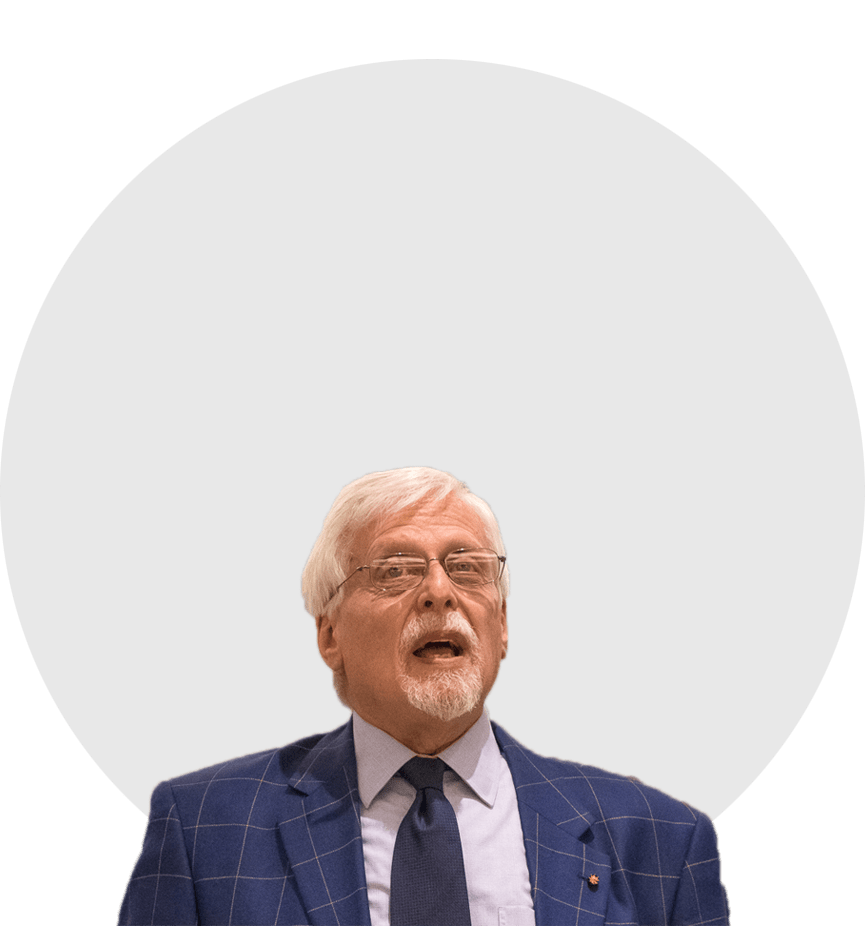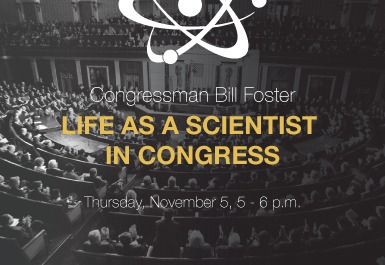
Distinguished Speaker Series
Featured Recording
Dr. Freeman Hrabowski
President, University of Maryland, Baltimore County
We welcome renowned experts working at the intersection of science and society for these monthly lectures, which take place in early evening and are open to the public. These events represent an incredible opportunity to explore the cutting edge of bioethics, science policy, and more. Further, these lectures aim to strengthen connections between the Duke community and leaders in science and society from around the world. Each lecture is followed by a light reception, where attendees mingle and enjoy lively discussion.
2015-2016 Speakers
Congressman Bill Foster
Thursday, November 5, 2015 5 p.m.
 Life as a Scientist in Congress
Life as a Scientist in Congress
Join us as Congressman Bill Foster, a physicist turned politician, discusses how he applies the rigors of science to engage American politics—and why we need more scientists in government.
Congressman Bill Foster represents the 11th Congressional District of Illinois. He is the co-founder of the Inventions Caucus, a participant in the Congressional Oversight of the proposed Iranian nuclear deal, member of the Financial Services Committee and of the House Committee on Science and Space Technology.
Dr. Freeman Hrabowski
Tuesday, February 23, 2016 5 p.m.
With an introduction by Duke President Richard H. Brodhead
 Minorities in STEM: Empowering the Next Generation
Minorities in STEM: Empowering the Next Generation
For decades, minorities have been underrepresented in STEM. With an eye on systemic injustice, how do we enable and encourage minorities to seek STEM education, increase their confidence to pursue these advanced degrees, and create communities of support?
Join us with Dr. Freeman A. Hrabowski, President of the University of Maryland, Baltimore County, for a conversation on race, STEM education, and academic success.
Gina Kolata
Tuesday, March 22, 2016 5 p.m.
 The Story Behind the Story
The Story Behind the Story
Join award-winning New York Times science journalist Gina Kolata as she discusses storytelling and its role in science journalism. And hear the story behind her stories in her newspaper article and recent book—all stemming from an elderly man with a mystery disease.
Gina Kolata studied molecular biology as a graduate student at MIT and received a master’s degree in mathematics from the University of Maryland. During her career as a science journalist she has been a two-time finalist for the Pulitzer prize and has published numerous books exploring topics from weight loss and fitness, to sex and cloning.
2014-2015 Speakers
The End of Sex: What is the future of human reproduction?
Wednesday, September 10, 5 p.m.
Professor Hank Greely, Stanford Law School
Within the next 20 to 40 years, it is likely that the majority of babies in developed countries will be conceived in IVF clinics and receive whole genome sequencing as embryos, before being selected for transfer to a womb. Prof. Greely will discuss how and why this will come to pass, before exploring some of its consequences. Click here for more info.
Science in the White House: How science policy gets done in Washington
Tuesday, October 7
Michael J. Stebbins, PhD, Assistant Director for Biotechnology at the White House Office of Science and Technology Policy
Dr. Stebbins is responsible for efforts in the life sciences, agriculture, veterans mental health, biotechnology, and open science. Click here for more info.
The Interferon Tournament: The first great race in biotech
Wednesday, November 5
Nicolas Rasmussen, Professor, History & Philosophy of Science, University of New South Wales
In 1980, what the public most wanted from newfangled gene-splicing technology was interferon. Patients imagined a cure for cancer, scientists dreamed of the Nobel they’d win for cloning it, while venture capitalists saw dollar signs. This talk recounts the race to clone interferon and the subsequent sweepstakes to profit from it. The history of interferon offers a compelling narrative of the early collision of high-stakes science with high finance. Click here for more info.
From the Lab to the Hill: Teaching scientists the critical art of public policy
Tuesday, November 18
Mark S. Frankel, PhD, Director of the Scientific Responsibility, Human Rights and Law Program at AAAS
Come hear Dr. Mark Frankel, from the prestigious DC-based AAAS, as he discusses the critical role of scientists in fostering science literacy and informing public policy. Learn about the challenges faced by scientists and policymakers in integrating science into policy decision-making, and Dr. Frankel’s vision for how to improve the science-society relationship. Click for more info.
Never Talk to the Media; Never Trust the Government: Bad Advice
Tuesday, January 27
Kathy Hudson, Deputy Director of NIH for Science, Outreach and Policy, and Joe Palca, science correspondent at NPR
Innovations in science transform our society and inform government policy choices. The challenges of communicating the realities and practicalities of science to the public and policymakers is vital, yet the media and the government may portray science in different ways. How does the media and the government communicate new science to the public? And what are the challenges of coordinating interests of the media and government in science policy? Click for more info.
Patients with Passports: Medical Tourism, Law, and Ethics
Tuesday, April 7
Can your employer require you to travel to India for a hip replacement to reduce its healthcare costs? If injury results, can you sue? Can the US prohibit you from travelling abroad to help a relative with assisted suicide—or to obtain an abortion? Join Prof. I. Glenn Cohen, who will discuss the economics, law, and ethics of “medical tourism.” Medical tourism is a growing multi-billion dollar industry involving millions of patients who travel abroad each year to get health care.
I. Glenn Cohen is Professor of Law and the Faculty Director of the Petrie-Flom Center for Health Law Policy, Biotechnology & Bioethics at Harvard Law School. He is one of the world’s leading experts on the intersection of bioethics and the law, as well as health law.

